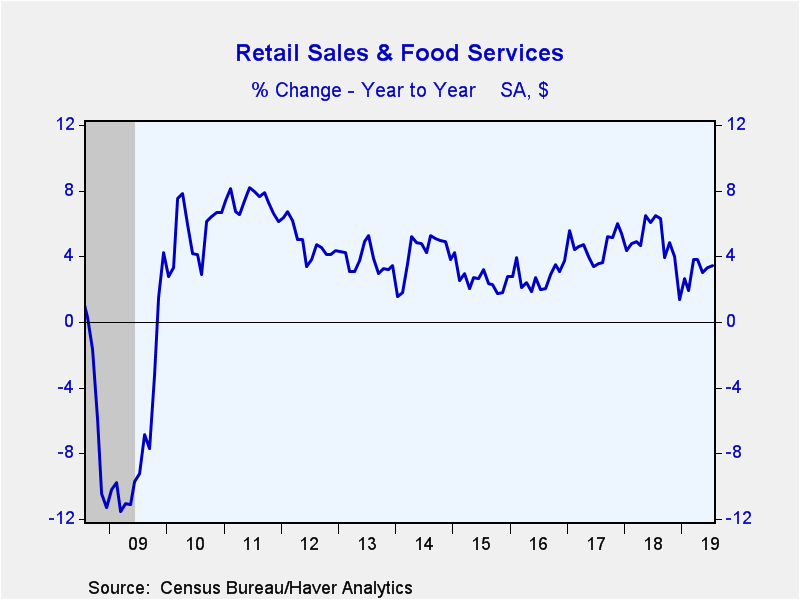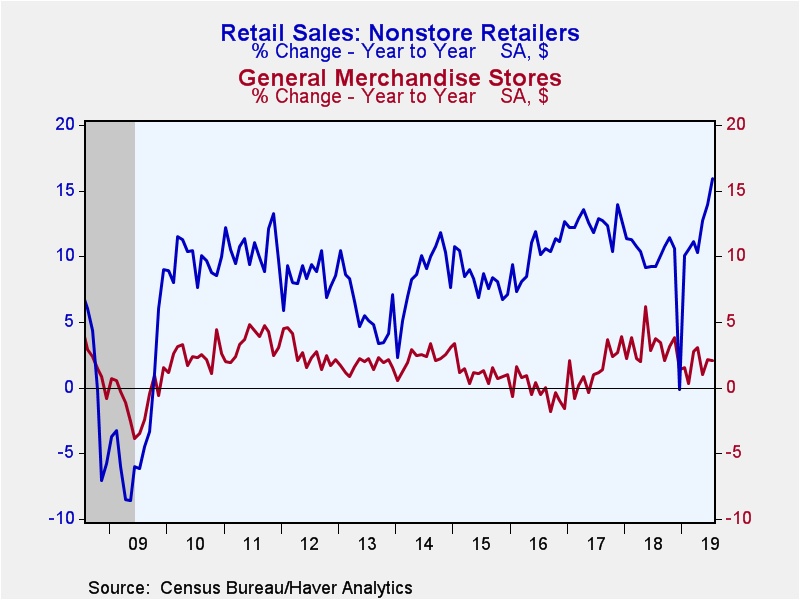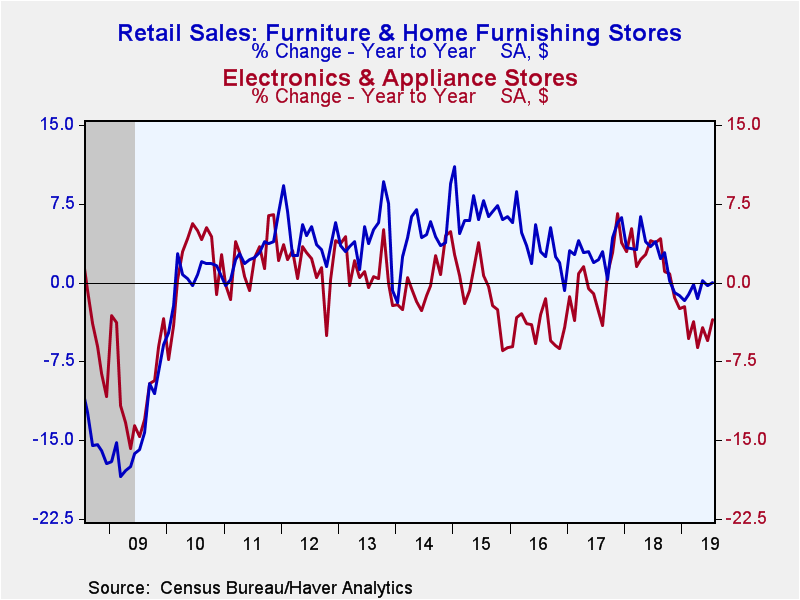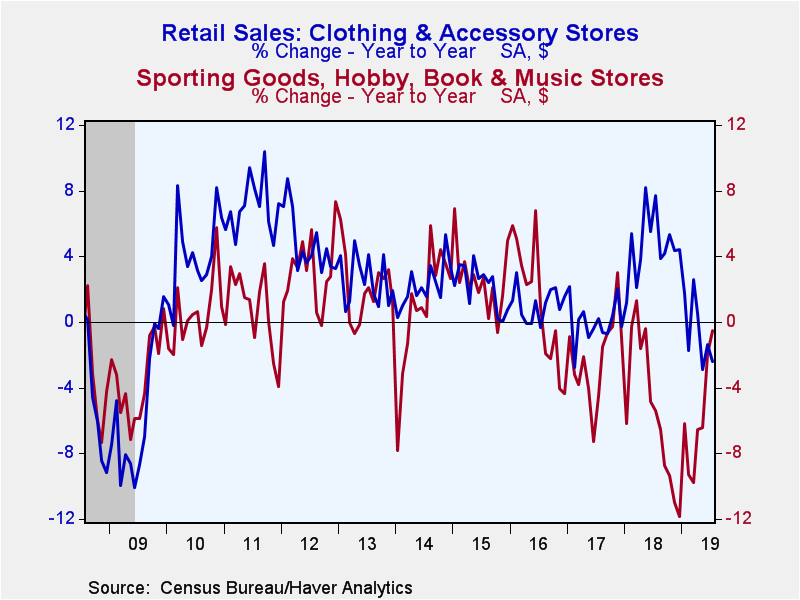 Global| Aug 15 2019
Global| Aug 15 2019U.S. Retail Sales Post A Strong Increase; Nonauto Sales Surge Unexpectedly
by:Tom Moeller
|in:Economy in Brief
Summary
Consumer spending continues to exhibit strength. Total retail sales rose 0.7% (3.4% y/y) during July following a 0.3% June rise, revised from a 0.4%. May's increase was revised to 0.5% from 0.4%. A 0.3% July sales gain had been [...]
Consumer spending continues to exhibit strength. Total retail sales rose 0.7% (3.4% y/y) during July following a 0.3% June rise, revised from a 0.4%. May's increase was revised to 0.5% from 0.4%. A 0.3% July sales gain had been expected in the Action Economics Forecast Survey. Retail sales excluding motor vehicles and parts gained 1.0% (3.7% y/y). It was the largest increase since March. June's 0.3% rise was revised from 0.4% and May's 0.5% gain was revised from 0.4%. The latest reading compared to expectations for a 0.5% improvement.
Purchases of motor vehicle & parts held back last month's overall sales increase with a 0.6% decline (+2.3% y/y). It followed two months of modest increase. Last month's result compared to a 2.0% m/m easing in unit sales of motor vehicles.
A measure of the underlying pace of retail spending is nonauto sales growth excluding gasoline and building materials. These sales rose 1.0% (5.1% y/y) last month. That followed a 0.7% gain in June and a 0.8% May increase.
Sales exhibited broad-based improvement last month. Internet sales strengthened 2.8% (16.0% y/y) after a 1.9% rise. Electronics & appliance store sales increased 0.9% (-3.5% y/y) and reversed June's decline. Apparel & accessory store buying strengthened 0.8% (-2.4% y/y) after two minimal declines. General merchandise stores gained 0.6% (2.1% y/y) after a 0.1% rise. Furniture & home furnishing store sales improved 0.3% (0.0% y/y) following modest declines in the prior two months. Purchases at building materials & garden equipment stores rose 0.2% (-2.9% y/y), the same as in June. Showing weakness were purchases at sporting goods, hobby, book and music stores which fell 1.1%, the largest decline since December. The y/y decline moderated, however, to -0.5% versus an 11.8% y/y shortfall in December.
Strengthened by higher prices, gasoline service station sales rose 1.8% but held steady y/y.
Sales of nondiscretionary items were mixed last month. Food & beverage store sales increased 0.6% (3.4% y/y) after a 0.8% rise. Health & personal care product store sales slipped 0.2% (+4.3% y/y) after rising 0.6% in June.
Restaurant & drinking establishment sales increased 1.1% last month (3.8% y/y) after five months of strong gain.
The retail sales data can be found in Haver's USECON database. The Action Economics forecast is in the AS1REPNA database.
| Retail Spending (% chg) | Jul | Jun | May | Jul Y/Y | 2018 | 2017 | 2016 |
|---|---|---|---|---|---|---|---|
| Total Retail Sales & Food Services | 0.7 | 0.3 | 0.5 | 3.4 | 4.9 | 4.2 | 3.0 |
| Excluding Autos | 1.0 | 0.3 | 0.5 | 3.7 | 5.5 | 4.6 | 2.6 |
| Retail Sales | 0.6 | 0.3 | 0.4 | 3.4 | 4.7 | 4.0 | 2.7 |
| Motor Vehicle & Parts | -0.6 | 0.3 | 0.4 | 2.3 | 2.6 | 2.8 | 4.4 |
| Retail Less Autos | 1.0 | 0.3 | 0.4 | 3.7 | 5.3 | 4.4 | 2.1 |
| Gasoline Stations | 1.8 | -2.3 | -0.2 | 0.0 | 12.9 | 8.2 | -5.7 |
| Food Service & Drinking Places Sales | 1.1 | 0.7 | 1.1 | 3.8 | 6.4 | 5.5 | 5.5 |
Tom Moeller
AuthorMore in Author Profile »Prior to joining Haver Analytics in 2000, Mr. Moeller worked as the Economist at Chancellor Capital Management from 1985 to 1999. There, he developed comprehensive economic forecasts and interpreted economic data for equity and fixed income portfolio managers. Also at Chancellor, Mr. Moeller worked as an equity analyst and was responsible for researching and rating companies in the economically sensitive automobile and housing industries for investment in Chancellor’s equity portfolio. Prior to joining Chancellor, Mr. Moeller was an Economist at Citibank from 1979 to 1984. He also analyzed pricing behavior in the metals industry for the Council on Wage and Price Stability in Washington, D.C. In 1999, Mr. Moeller received the award for most accurate forecast from the Forecasters' Club of New York. From 1990 to 1992 he was President of the New York Association for Business Economists. Mr. Moeller earned an M.B.A. in Finance from Fordham University, where he graduated in 1987. He holds a Bachelor of Arts in Economics from George Washington University.
More Economy in Brief
 Global| Feb 05 2026
Global| Feb 05 2026Charts of the Week: Balanced Policy, Resilient Data and AI Narratives
by:Andrew Cates










